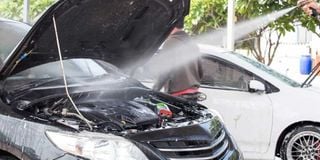Prime
Ask the Mechanic: How can I clean my car engine at home?

What you need to know:
I keep reading that engines should not be tampered with, including having them washed. How do I keep my engine clean at home?
Hello Paul, each time I open my car bonnet to either have the oil checked or fill wiper water, the engine is always dusty. I keep reading that engines should not be tampered with, including having them washed. How do I keep my engine clean at home?
Carol.
Hello Carol, although all the stuff under the bonnet might look like a Pandora’s Box to the non-technical, everything in there has to be quite robust and fairly weather-proof otherwise it would not survive regular use. After all, the engine compartment has no floor and is open to the road below, and it is frequently splashed with water from puddles, and mud, and oil spills, and dust. That is why engines get dirty in the first place. There are under-bonnet parts which get red hot and are also subject to fearsome shaking if the road is rough.
Almost everything in the engine compartment has nothing to fear from you armed with a damp cloth and some soap or solvent cleaning fluid. At the same time, none of it has been designed to work as a submarine, so while plenty of vigour is okay in most places, (even spray from a hosepipe or pressure washer) a little discretion is called for.
First timers can begin with just a damp cloth. You can wipe anything and everything you can reach with that, safely. If you come across patches that are oily, emulsify those with a dab of petrol or kerosene or a branded engine cleaner. For patches of caked mud that need to be scraped off, use a soft plastic or wooden utensil to avoid scratches.
As you make this debut, try and figure out the parts that are likely to be most sensitive to “flooding” with water (everything must be able to handle a little indirect spray or a damp cloth).
The bits that might not do well with copious streams of water are the alternator and (in petrol engines) the distributor cap, the coil and their electric cable leads. Go carefully near old-fashioned battery caps (which have breather holes in them). Take care not to get water inside the air filter. Equally, you do not have to hermetically seal these things. A little overspray while washing other things will do no harm.
As you build understanding and confidence, common sense will guide you on where to use a rag on bigger surfaces, where to use a paintbrush to get into awkward corners and so on, and improve your dexterity with a hosepipe for rinsing.
In this learning curve, it can be helpful to have the engine warm before you start (for your own sake not too hot) and to start the engine as soon as you have finished to accelerate drying even in hidden away crevices and near electrical connections, and demolish potential drips.

Engine oil
WHAT CAUSES PETROL TO MIX WITH ENGINE OIL?
Hello Paul, I have a 1995 Hyundai Accent with a carburetor. A few days ago, while draining oil, I realised it had more of fuel than oil. What could be the cause?
Celimpilo Hlongwane
Hello Celimpilo, there is an accumulation of unburnt petrol in the combustion chambers. This petrol seeps past the piston rings down the cylinder walls to contaminate the engine oil in the oil sump. Excessive unburnt or uncombusted petrol can be caused by a faulty carburetor, whose worn out jets deliver unregulated amounts of petrol, more than can be burnt combusted.
The other potential cause of petrol accumulation is faulty ignition system due to damaged ignition cables or severely worn out spark plugs. Have these two areas inspected or rectified urgently.
When petrol contaminates engine oil, it rapidly alters the oil viscosity and protective additives blended with oil. This affects the oil performance in preventing metal sheer damage, frictional wear, corrosion as well as overheating. If unresolved, soon, the engine will be severely damaged.
Send sms: mycar (space) your comments and questions to 6933
Or email them to: [email protected]




